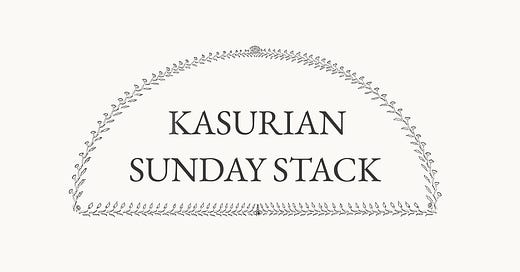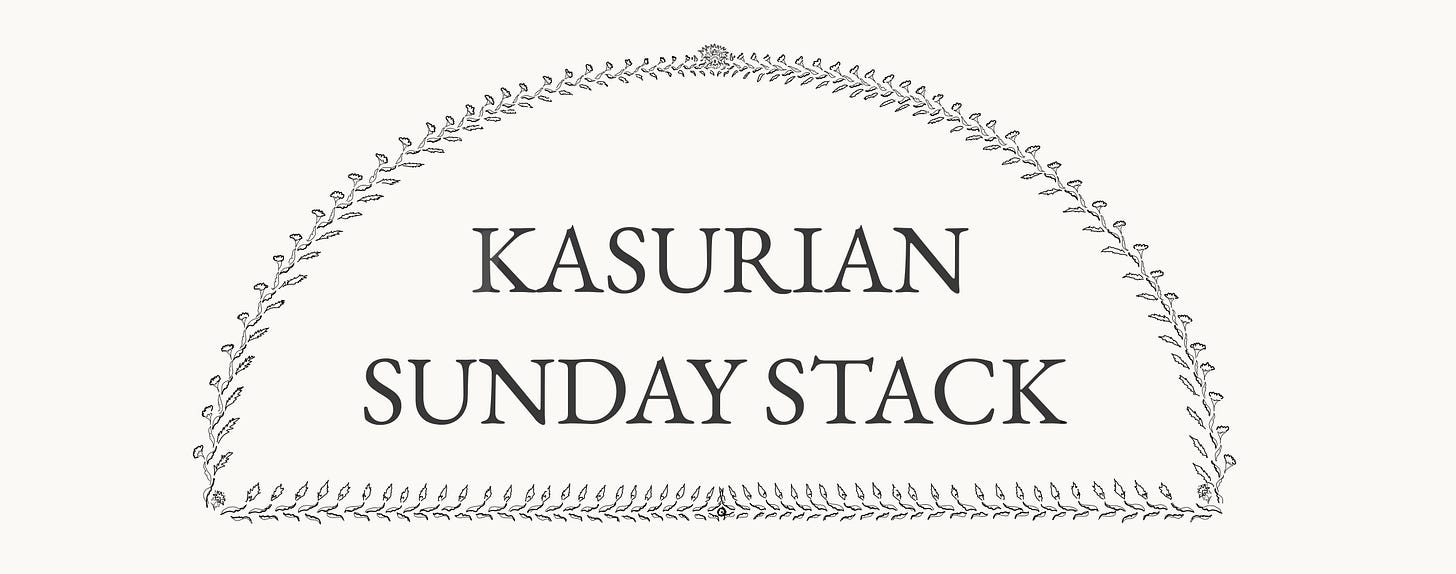Sunday Stack: March 2025
Curated slow reads for the month ahead, and an Eid Mubarak to all our readers.
Eid Mubarak from the editorial team at Kasurian. Kul ‘aam wa antum bikhayr (كل عام وأنتم بخير) — may every year find you and your loved ones well.
Next Sunday, Kasurian will publish an essay exploring the utopian foundations of the Royal Society of Arts, its institutional importance in creating British culture, and how science fiction can create positive visions for the future of civilisation.
In the meantime, enjoy the Sunday Stack, a monthly roundup of essays curated by our editors. With this monthly series, we hope to nurture a long read culture and help you discover essays worth settling into.
America’s Never-Ending Battle Against Flesh-Eating Worms (The Atlantic)
This essay shines a light on one of the unspoken heroics of state and scientific power in the 20th century: the war against flesh-eating screwworms. For millennia, screwworms had plagued North America’s animal population and were a scourge on farmers and cattle ranchers. The United States Department of Agriculture (USDA) spearheaded a systematic effort to eliminate screwworms across North America and drove them back to ‘the Wall’ at the isthmus of Panama, where the USDA has kept guard for 50 years to ensure the screwworms never return.
This essay is for anyone interested in the hidden histories of science, agriculture and public service.
Bewildered Rhapsodies (The New York Review of Books)
The politics of translation is always tricky, not least concerning the history of attempts to translate the Quran into English. This essay surveys the historical attempts to render the Quran into an English legible for its time, while maintaining its Arabic eloquence.
This essay is for anyone interested in history, the politics of translation, and the Quran’s divine Arabic eloquence.
Breakfast for Eight Billion (The New Atlantis)
A deep dive into three practices that have enabled, for the first time in human history, true abundance on a global scale in food: fertilisation, irrigation, and genetics. Since the 1980s, human hunger has been no longer a question of scarcity but inefficient distribution.
This essay is for anyone interested in the scientific and logistical enterprise of food production.
How Should One Read a Book? (Yale Review)
A classic always worth revisiting, How Should One Read a Book, published by Virginia Woolf in 1926, is a creative plea and guide on reading with an open mind, and for joy instead of utility. Woolf encourages readers to embrace both the perspective of the writer and the “common reader” whom she saw as the “guides of literary evolution”.
This essay is for anyone who loves literature, writing, and the English canon.
King of Fruits (Works in Progress)
The fascinating history and economics behind the pineapple and its transformation from a luxury fruit into a commonplace product. The story of the pineapple is the same as many other products in our cupboards and fridges that we take for granted, and the immense scientific, economic, and logistical efforts to make them commonplace today.
This essay is for anyone interested in pineapples and the economic transformation of luxury products into everyday items.
Rifling Through the Archives With Legendary Historian Robert Caro (Smithsonian Magazine)
This essay is a warm behind-the-scenes look at the painstaking research methods of the legendary historian and writer, Robert Caro. While some know Caro as the man who wrote only about Lyndon B. Johnson, Caro insists he is writing not just about the man, but about power, and American imperial power, itself: how it is gained, how it is used, and what it does to people.
This essay is for anyone who believes history is in the details, and that all great writing begins with relentless curiosity.
The Long Quest for Artificial Blood (The New Yorker)
The story of the quest to create synthetic blood, from 17th-century experiments with blood transfusions to 19th-century lifesaving breakthroughs that made transfusions viable on a mass scale, to the 21st century as scientists attempt to create synthetic blood. Replicating the “magical fluid” of blood is no easy task; even today, like the human mind, we know little with certainty about blood, its functions, and its properties.
This essay is for anyone interested in medicine, technology, and the enduring scientific mysteries of one of the most vital elements of life.
The New Space Race with China (Palladium Magazine)
America and China are in a new space race—except America doesn’t seem to know it. China’s technology industry has gone from strength to strength over the past decade and now seeks glory in space as part of its project of national renewal. In that race, SpaceX is America’s last advantage against Chinese technology and ambition. Will their payloads deliver?
This essay is for anyone interested in the geopolitical competition between America and China, the state of their space industries, and the return of space as the new frontier after decades of public disinterest.
The U.S. Synthetic Rubber Program (American Affairs Journal)
The synthetic rubber materials consumed on a global scale today arose out of the messy politics to push synthetic rubber production and research & development in WWII, pioneered by President Roosevelt’s industrial policy initiatives to build America’s war-time economy.
This essay is for anyone interested in how good industrial policy creates industries, particularly in light of geopolitical competition between America and China today.
What AI Teaches Us About Good Writing (Noema Mag)
The existential threat of writing in the face of AI forces us to grapple with what makes good writing good. While AI can expedite the writing process, ultimately, AI’s predictive, pattern-matching output fails to match the distinct voice and emotional depth and connection of human writers.
This essay is for writers who see the value of AI in the writing process, but understand the irreplaceable human insight and craft essential to good writing.





Eid Mubarak! 🥳
It's an interesting collection of compiled Reads, albeit all skewing in the Heavy Technophile direction. That said, I have never had an issue with reading what 'The Other Team' has to say, so thank you for the list, will go over them, one by one, when Time Permits, Inshallah! 😊
Expected something more compelling than essays from aging and increasingly less relevant American publications.